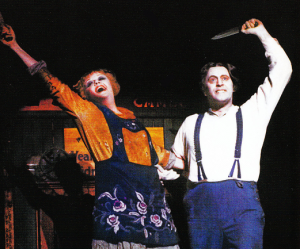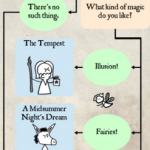I’m in transit today. It’s the weekend of the Harvard-Yale football game, and I’m headed up early to see the campus production of Sweeney Todd: The Demon Barber of Fleet Street. So while I navigate wind and rain and buses and trains, you can check out the paper I wrote on Sweeney’s moral code for my Sondheim seminar last year. I’ve uploaded the document “If Only Angels Could Prevail: The Moral Tragedy of Sweeney Todd” to Scribd.
To be honest, I love Sweeney and Sondheim so much that I’d be sorely tempted to share the paper even if it had no relevance to religion, but, given that the main reaction I got from the friends who read it was, “You are such a crypto-Catholic” I guess it falls within this blog’s purview. Basically, I was looking at Sweeney as a moral fable in a world that’s fallen a lot farther than ours (plus raking the movie version over the coals for eliminating the chorus from the show). Teaser quote below, followed by a clip of Neil Patrick Harris and Patti LuPone singing “Nothing’s Gonna Harm You.”
Sondheim and Wheeler build up a world that is practically impervious to goodness. The monstrosity they engineer births the bestial chorus, forced to retreat into madness. The chorus and Tobias—who has joined them in their insanity by the end of the show—have made a complete break with the sordid reality they find themselves in. The residents of the madhouse are authentic—they admit how they have been destroyed by their world. Mrs. Lovett is terrifying because she refused to acknowledge her own brokenness.
Mrs. Lovett embodies the cheerful nihilism that Lahr tried to ascribe to the whole production. Every ounce of her artifice is spent in denial of the bleakness of her world. She doesn’t escape the harshness of the world by trying to ignore its immorality; she denies the fact that immorality is abhorrent. She never sees a distinction between Sweeney’s revenge on the Judge and the deaths of anyone else unlucky enough to enter the tonsorial parlor. The malevolence of the Judge does not register with her as willed evil. The cruelty of men is not tragic for Lovett, but as natural as a thunderstorm. Both are threatening, but neither carries moral content.













